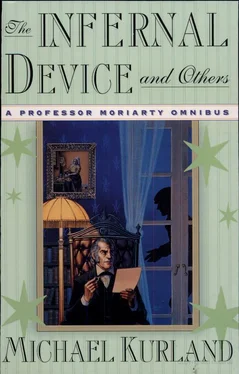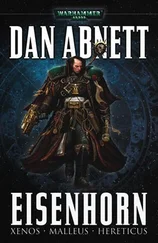"There are, however, several items of interest in the account," Moriarty said.
"What items do you find interesting?"
"Ah!" Moriarty said. "More examples are requested. There is, for example, the question of motive. There are five motives for murder: greed, lust, fear, honor, and insanity. Which was this?"
"Scotland Yard is of the opinion that Lord Walbine was killed by a burglar."
"Greed then," Moriarty said. "But surely we have a most unusual burglar here: one who goes straight to the master bedroom when there are cupboards full of silver in the pantry; one who lays his lordship full length out on his bed and slashes his throat instead of giving him a friendly little tap on the head with a blunt object. And then one who disappears in a locked room."
"You just intimated that you knew several men who could have done it," Barnett said.
"Ah, yes. But again we come to the question of motive. Why would a burglar have gone to the additional trouble of closing the room after him? Why not just go out of the window and down the drainpipe?"
"I don't know," Barnett replied.
"And if it was indeed an interrupted act of burglary, what of the murder of Isadore Stanhope, the barrister, last week? Or the Honorable George Venn before that? All with their throats slit; all in their own bedrooms. One with his wife asleep in the adjoining bedroom, the other with a faithful hound lying undisturbed at the foot of the stairs. And nothing of value missing in any of the crimes. A singular burglar indeed!"
Barnett put down his spoon and stared across the table at his companion. Moriarty had not so much as glanced at the morning newspapers. Further, Barnett was willing to swear he hadn't seen a newspaper in the past three weeks. Moriarty scorned newspapers, and seldom opened them. One of Barnett's jobs was to keep a clipping file of current crime stories and other items that might interest the professor, but the last three weeks' clippings lay in a box, un-sorted and unfiled, on Barnett's desk. Yet somehow Moriarty knew the details of the three linked murders, as he seemed always to know all that was happening in London and most of what was happening throughout the world.
"You have another theory, then?" Barnett suggested.
"One should never theorize with insufficient facts," Moriarty said. "It is a practice most destructive of the mental faculties. As I said, there are some obvious questions that should be asked. The answers should give one a clear picture of the murderer and his motive."
"Such as?"
Moriarty shook his head. "I don't understand your fascination with this," he said. "A mundane series of murders with nothing to recommend them to the connoisseur. Reminiscent of Roehm in Düsseldorf a few years back, or the notorious Philadelphia Fox murders in '78. The only mystery in such cases is how the police can be so inefficient."
"As I remember," Barnett said, "they never caught the Philadelphia Fox."
"My point exactly," said Moriarty.
"If the investigation were in your charge," Barnett asked, "what would you do?"
"I resist the answer which springs to my lips," Moriarty said, with a hint of a smile, "as the language involved is rather coarse. However—" The professor removed his pince-nez lenses once again and began polishing them with his napkin. As he did he stared absently across the table at the Vernet which hung above the sideboard, a three-by-five-foot oil entitled Landscape with Cavalry.
Barnett watched with interest as the professor polished his lenses and stared unseeingly across the room. He was watching Moriarty think, as impressive an event to Barnett as watching Norman-Néruda play the violin or watching W. S. Gilbert scribble. Something incredible was happening right there in front of you, and if you were very lucky there was always the chance that some of whatever it was would rub off on you.
"The question of motive," Moriarty said, readjusting his pince-nez on his nose, "would seem to be the most promising. Of the five I cited, we can eliminate but one: insanity. I would concentrate on the backgrounds of the three men to establish what they had in common, to try to find a common denominator for our killer."
"I don't know, Professor," Barnett said. "The way those three were killed seems pretty crazy to me. Slitting their throats in their own beds, then sneaking out past locked doors and sleeping dogs."
"Slitting their throats may be an action of insanity," Moriarty said, "but it seems to me that the subsequent innocuous departure was eminently sane."
Mr. Maws, Moriarty's butler, appeared at the dining-room door. "Beg pardon, Professor," he said in his gravelly voice, "but there is a gentleman to see you. An Indian gentleman. I took the liberty of placing him in the drawing room."
Moriarty pulled out his pocket watch and snapped it open. "And nine minutes early, I fancy," Moriarty said. "No card?"
"None, sir. He did mention the lack, sir. Apologized for not having one. Gave his name as Singh."
"I see," Moriarty said. "Tell the gentleman I shall be with him in a few moments."
"Nine minutes early?" Barnett asked, as Mr. Maws withdrew to reassure their visitor.
"It is nine minutes before ten," Moriarty said. "This also came in the first post." He extracted an envelope from his jacket pocket and flipped it across the table to Barnett. "What do you make of it?"
The envelope was a stiff, thick, slightly gray paper that Barnett was unfamiliar with, as was the paper inside. The address on the envelope, James Moriarty, Ph.D., 64 Russell Square, City, was done with a broad-nibbed pen in a round, flowing hand. The handwriting on the letter itself was more crabbed and angular, written with an extremely fine-pointed nib.
"Two different hands," Barnett noted. "Let's see what the note says":
James Moriarty, Sc.D.—
Will be calling upon you at ten of the a.m. tomorrow morning. Am hopeful to find you at home at that instant. Am hopeful to interest you in impossible but potentially lucrative endeavor. Have been informed by several that you are man most likely to talk to in this regard. With greatest hopes and much potential thanks, I am name of Singh.
"Very interesting stylistically, if not very informative." Barnett held the note up to the light. "I don't recognize this paper. No watermark. No crest. But it is a thick, expensive paper of the sort used for printing invitations, possibly. It's an odd size; almost square."
"What does all of this tell you?"
"Well," Barnett considered. "Nothing really beyond what it says. A gentleman named Singh will call at ten and he has some sort of proposition to put to you."
"A reasonable conclusion," Moriarty said, "confirmed by the fact that the gentleman has indeed shown up a trifle before the hour. Nothing more?"
"No, not really."
"Any suggestion regarding the distinctly different hands on the message and the envelope?"
"No. It is curious, I admit. But no ready explanation for it springs to my mind. What does it tell you?"
"That, and the unusual shape of the paper, do offer a field for speculation," Moriarty said, pushing himself to his feet, "but there is no point in indulging in that pernicious habit when the object of our speculation awaits us in the drawing room."
"You wish me to be present at the interview?"
"If you like."
"Thank you, but I think not. I really should get to the office."
"I thought the admirable Miss Perrine was handling the affairs of the American News Service."
"She is, and very well," Barnett said. "She controls a staff of nine reporters, four secretary-typists, three telegraphists, and assorted porters, page boys, errand boys, and the like with a hand of iron. A very exceptional young lady."
"She enjoys this position of authority?" Moriarty asked.
Читать дальше












